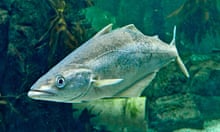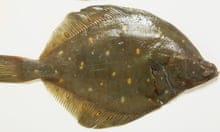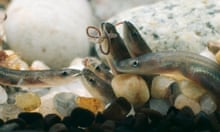Half of Britain’s 10 largest fish populations are in a “deeply troubling state”, having been either overfished or depleted to a critically low size, according to a new report. The situation is being driven by the UK government setting catch limits at levels that exceed scientific advice, said Oceana, a Washington DC-based NGO.
The UK’s fishing industry relies heavily on 10 key stocks. Five are either being overfished, including mackerel, which accounted for the largest volume of landings in the UK in 2021, or have reached critically low populations, such as North Sea cod. Many cod species are in crisis, pushing the popular fish close to population collapse.
The chef and environmental campaigner Hugh Fearnley-Whittingstall said: “The stark fact is that overfished stocks have one thing in common: they are on course for collapse. If that is allowed to happen, the human livelihoods will go with them just as fast as the marine ecosystems they support. Our government needs to step up today to prevent the UK from losing its fish and starving its seas.”
In a foreword to Oceana’s Taking Stock report, Fearnley-Whittingstall condemned what he said was the “reckless habit of past decades, of bunging in an extra 20% more to keep the fishers sweet”. He called on the government to set sustainable catch limits.
The report examined a wider total of 104 populations of fish, most of the UK’s commercial fish stocks. A third (34%) are being overfished and only 45% are being sustainably fished. The rest could not be assessed due to a lack of data, it found.
In addition to fishing pressure, the audit also assessed population size, finding that less than half (41%) were at a healthy size and a quarter were in critical condition. Again, the remainder could not be assessed due to a lack of data.
Hugo Tagholm, the director and vice president of Oceana in the UK, accused the government of ignoring the science and “rubber stamping” the exploitation of the seas. “Our government claims to be striving for a ‘gold standard’ in fisheries management, but we have not reached it. It is time for the UK to show political leadership and commit to catch limits in line with the science and a clean and ambitious strategy to end overfishing,” he said.
Tagholm said it was clear that where scientific advice is followed and sustainable catch limits are set, fish populations are healthy – a situation that benefits coastal communities and the environment.
He stressed that the overfishing was not due to small inshore fishers that make up almost 80% of Britain’s fleet, but industrial fisheries. “Only 3% of our quota goes to small inshore fishermen in place like Newlyn,” he said.
Three of the worst-managed populations – Celtic Sea cod, West of Scotland cod and Irish Sea whiting – are so low that the International Council for the Exploration of the Sea (Ices), a body providing advice on delivering sustainable yields, has advised a total ban on all catches.
Sustainable catch limits lead to healthier fish populations, the report argues. For instance, for the five best performing stocks, catch limits for 2020-2023 were mainly set in line with Ices scientific advice. Conversely, for four of the five worst performing stocks, catch limits were set higher than the scientific advice.
The report’s aim is to provide an evidence-based snapshot of the status of UK fish stocks now the country has left the EU and the common fisheries policy. From January 2021, the UK became responsible for setting total allowable catch limits in its own waters. But as most stock are shared, the EU and UK have agreed to develop joint recommendations annually through the Trade and Cooperation Agreement. This process involves reviewing the scientific advice on limits from Ices.
Oceana found that repeated political decisions to set catch limits higher than scientifically advised continues to lead to overfishing. Six stocks that were a healthy size in 2020 have now declined to a critical state, and only three stocks have moved from being critically low to healthy since 2020.
In response to the Taking Stock report, a spokesperson for the Department for Environment, Food and Rural Affairs, said it had announced a package of reforms in the summer which marked a “clear departure from the outdated EU common fisheries policy and which will deliver a profitable fishing industry underpinned by sustainable fish stocks and a healthy marine environment for the future”.
The reforms are underpinned by fisheries management plans for how best to manage stocks, which have been developed together with the industry, drawing on the best available science, it said.
“Our priority when negotiating and setting catch limits is always to make sure that fisheries are managed sustainably, as well as safeguarding valuable fishing opportunities for the UK industry.”









